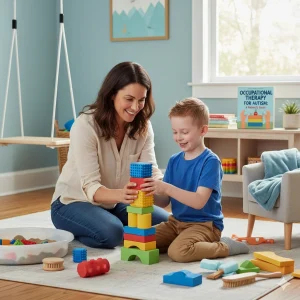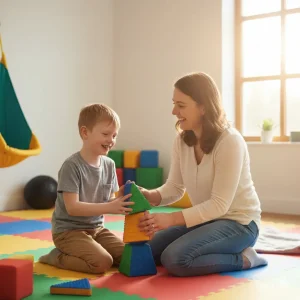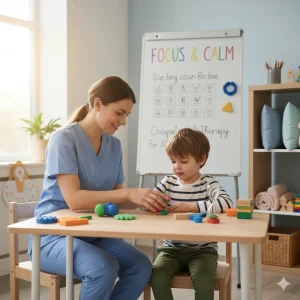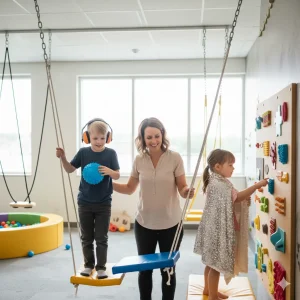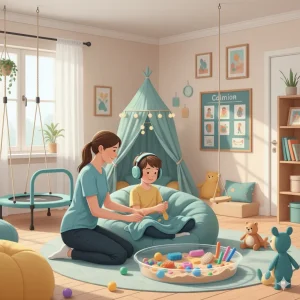Why Is My 4-Year-Old’s Speech Still Unclear?
By Wellness Hub
Last Updated: October 7, 2025
Has your 4-year-old ever started a story with excitement, only for you—or others—to struggle to understand the words? You’re not alone. Many parents wonder, “Why is my 4-year-old’s speech still unclear?” At this age, most children can express themselves in sentences, but their speech clarity should also be improving. By 4, a child’s speech is expected to be understood by strangers about 75% of the time. If your child is still difficult to understand, it may leave you worried, comparing them to peers, or even questioning if it’s normal.
The truth is, some unclear sounds at age 4—like “r,” “th,” “sh,” or “l”—are part of normal speech development, while other patterns may signal a speech sound disorder, phonological process, or even hearing issues. Knowing the difference is the key. In this guide, we’ll explain what’s typical, what may be a red flag, and when it’s the right time to seek help from a speech-language pathologist (SLP).
How Clear Should a 4-Year-Old’s Speech Be?
Many parents ask, “How clear should a 4-year-old’s speech be?” By age four, children are usually much easier to understand than when they were toddlers, but some speech differences are still expected. Speech clarity in 4-year-olds—often called speech intelligibility—is a key milestone that parents and teachers notice.
Experts use a guideline known as speech intelligibility norms. At this age:
- Parents and family members should understand almost everything their child says.
- Strangers should understand at least 75% or more of a 4-year-old’s speech.
- If a child’s speech is much less clear than this, it could be a sign to check in with a speech-language pathologist (SLP).
Sounds That May Still Be Hard at Age 4
Even when speech intelligibility is good, some sounds take longer to develop. It is still normal for a 4-year-old to have trouble with:
- “R” (as in rabbit)
- “L” (as in lion)
- “Th” (as in thumb or this)
- “Sh” (as in shoe)
- “Ch” (as in chair)
These sounds may not be mastered until ages 5–7. That means a 4-year-old saying “wabbit” instead of “rabbit” is still within normal development.
In short, a 4-year-old’s speech should be mostly clear to people outside the family, but a few tricky sounds are perfectly normal to still be working on. The key is steady progress—if your child is gaining new sounds and becoming easier to understand over time, that’s a positive sign.
Common Reasons a 4-Year-Old’s Speech May Still Be Unclear
Not every 4-year-old speaks clearly all the time, and that’s completely normal. But understanding the common reasons for unclear speech helps parents know when to simply wait and when to seek extra support. Below are some of the most frequent causes.
Normal Sound Development at Age 4
It’s important to remember that some mispronounced sounds at 4 are part of normal development. Children are still learning to master certain tricky sounds, and articulation errors are expected at this age.
Common sounds that may still be difficult include:
- “R” as in rabbit
- “L” as in lion
- “Th” as in thumb or this
- “Sh” as in shoe
- “Ch” as in chair
If your child says “wabbit” for rabbit or “fumb” for thumb, it often means they’re still developing speech muscles and sound patterns. Most of these sounds are mastered between ages 5–7.
Articulation vs. Phonological Processes
Sometimes unclear speech goes beyond individual sound mistakes. Articulation issues in 4-year-olds usually involve difficulty forming specific sounds correctly (like a lisp). On the other hand, phonological processes at age 4 are patterns of sound substitutions or simplifications.
Examples include:
- Fronting: saying “tat” for cat
- Cluster reduction: saying “pane” for plane
- Final consonant deletion: saying “ca” for cat
Some of these patterns are normal at age 4, but they should gradually fade as a child grows. If they continue past the expected age, it could be a sign of a speech sound disorder.
Childhood Apraxia, Dysarthria, and Oral-Motor Concerns
In some cases, unclear speech may be linked to motor-speech difficulties.
- Apraxia of speech in preschoolers: when the brain struggles to coordinate the mouth and tongue to form sounds.
- Dysarthria in children: when muscle weakness affects clarity, making speech sound slurred or slow.
- Oral-motor weakness in kids: difficulty with jaw, lips, or tongue movement that can affect sound production.
These conditions are less common, but they do require specialized support from a speech-language pathologist.
Hearing Issues and Frequent Ear Infections
Good hearing is essential for clear speech. If a child has hearing problems and unclear speech, it may be because they cannot consistently hear the difference between sounds.
Frequent ear infections causing unclear speech can also impact clarity, especially if they lead to fluid in the ear that muffles sound. A simple hearing check can rule this out and give peace of mind to parents.
Bilingualism and Dialects
For families raising children in more than one language, a bilingual 4-year-old with unclear speech can sometimes sound less clear—not because of a disorder, but because the child is navigating multiple sound systems. This is usually temporary and resolves with exposure and practice.
Similarly, language influence on speech sounds may affect clarity when children are growing up with different dialects or accents. Most often, this is normal and part of their unique language journey.
The bottom line: While some unclear speech at age 4 is normal, ongoing difficulties—especially if strangers cannot understand most of what your child says—may signal the need for a professional speech evaluation.
When Is Unclear Speech at Age 4 a Red Flag?
It’s natural for parents to wonder if their child’s unclear speech is part of normal growth or something that needs attention. The key is knowing the difference between a speech delay vs. a speech sound disorder. While a delay often means a child is developing at a slower pace but still in the right order, a disorder suggests that something is interfering with the way sounds are learned or produced.
The “Rule of Thumb” for Red Flags
A simple guideline many speech-language pathologists use is the intelligibility rule:
- By age 2, a child should be understood about 50% of the time.
- By age 3, about 75% of the time.
- By age 4, strangers should understand at least 75% or more of what your child says.
If your 4-year-old’s speech is less than 66% intelligible to people outside the family, it may be a sign that something more than typical development is going on.
Other Red Flags to Watch For
- Frustration: Your child becomes upset because others cannot understand them.
- Plateauing skills: Progress stalls for several months, with no new sounds or clearer speech emerging.
- Unclear speech in all settings: Even teachers, peers, or caregivers who see your child often struggle to understand.
- Limited sound variety: Your child uses the same few sounds for many words, making speech harder to follow.
- Signs of struggle: Extra effort, pauses, or unusual movements with the mouth when trying to talk.
When to See a Speech Therapist for a 4-Year-Old
If you notice these red flags, it’s best to seek a professional opinion. A licensed speech-language pathologist (SLP) can evaluate whether your child is simply a late talker or if there is an underlying issue like a speech sound disorder. Early support makes a big difference—many children improve faster with targeted therapy.
Bottom line: If your 4-year-old’s speech feels harder to understand than expected, or if progress seems stuck, trust your instincts. Getting an evaluation does not always mean therapy is needed right away, but it can give you peace of mind and a clear path forward.
What Parents Can Do at Home
Even if your 4-year-old’s speech is not yet perfectly clear, there are plenty of things you can do at home to support their progress. While professional therapy may sometimes be needed, speech therapy at home activities can make everyday routines more fun and educational. The key is to keep it playful, consistent, and stress-free.
Speech Clarity Activities for Preschoolers
Simple 4-year-old speech therapy exercises can help children practice new sounds and improve clarity:
- Mirror Play – Sit together in front of a mirror and make silly faces, tongue movements, and sounds. This helps your child see how their lips and tongue move when forming words.
- Listening Games – Play games like “I Spy” with sounds (e.g., “I spy something that starts with /s/”). This builds awareness of different speech sounds.
- Story Repetition – Read a short story or rhyme and encourage your child to repeat parts of it. Repetition strengthens both sound practice and memory.
- Sound Treasure Hunt – Pick a sound (like “sh”) and find objects around the house that begin with it, such as shoe or shampoo.
These activities make practice feel like play while reinforcing the building blocks of speech clarity.
Everyday Communication Tips
Alongside fun games, the way you talk with your child every day can make a big difference. Here are some strategies on how to help a 4-year-old with unclear speech:
- Slow Down and Be Patient – Give your child time to finish their thought without interrupting. Rushing can make unclear speech worse.
- Model Correct Pronunciation – Instead of correcting harshly, repeat their word back the right way. For example, if they say “wabbit,” you can reply, “Yes, a rabbit!”
- Read Aloud Daily – Choose simple, colorful books and read with expression. Hearing clear speech in context helps children learn naturally.
- Encourage Conversation – Ask open-ended questions (“What did you build today?”) to give your child more chances to practice speaking.
- Use Positive Reinforcement – Celebrate effort, not perfection. A smile, clap, or praise like “I love how you said that!” builds confidence.
With these home-based strategies, parents can gently strengthen their child’s communication skills. The goal is not to drill or pressure, but to create an encouraging environment where your child feels confident practicing their words.
When to See a Speech Therapist
Every child develops at their own pace, but sometimes unclear speech at age 4 needs a closer look. If your child is struggling to be understood by people outside the family, it may be time to consider speech therapy for unclear speech. Knowing when to seek professional help can save valuable time and support your child’s confidence.
When to Book a Speech Evaluation for a 4-Year-Old
You should consider scheduling a speech evaluation for your 4-year-old if you notice:
- Strangers understand less than 75% of your child’s speech.
- Your child becomes frustrated when trying to communicate.
- Speech progress seems to have stalled or plateaued for several months.
- Your child avoids talking or uses very short phrases to “get by.”
- Teachers, caregivers, or relatives also struggle to understand your child.
These are all signs that a professional opinion could be helpful.
What to Expect in a Speech Therapy Session
The first step is usually an evaluation with a licensed speech-language pathologist (SLP). During the session, the SLP will:
- Observe your child’s speech – listening to how they produce different sounds.
- Check overall communication skills – vocabulary, sentence length, and clarity.
- Screen for related issues – such as hearing, oral-motor skills, or phonological patterns.
- Share results in parent-friendly terms – explaining whether speech is within the normal range or if therapy would help.
- Create a therapy plan – suggesting fun, age-appropriate activities that target specific sounds or speech patterns.
Speech therapy sessions for preschoolers are often playful and engaging, using games, picture cards, and stories to encourage practice. Parents are usually given at-home strategies to keep progress going between sessions.
Bottom line: If you’re unsure whether your 4-year-old’s unclear speech is normal, booking an evaluation is the best step. Even if therapy isn’t needed right away, you’ll walk away with reassurance, guidance, and a clear plan for supporting your child’s communication.
Conclusion
If your 4-year-old’s speech is still unclear, remember—you are not alone. Many children take extra time to master certain sounds, and in most cases, progress happens naturally with age. Some mispronunciations at 4—like “r,” “l,” or “th”—are perfectly normal and will likely improve as your child grows.
At the same time, trust your instincts. If your child’s speech feels harder to understand than it should be, or if they seem frustrated when talking, it’s always worth seeking professional advice. Early speech therapy for unclear speech can make communication easier, boost your child’s confidence, and prevent bigger challenges later on.
If your child’s speech is unclear, consult a licensed speech-language pathologist to get peace of mind and the right support. Early guidance can make all the difference.
Frequently Asked Questions:
1. Should a 4-year-old’s speech be clear?
By age 4, most children can be understood by strangers about 75% of the time. If people outside your family often struggle to understand your child, it may be time to check in with a speech therapist.
2. What sounds are hard for 4-year-olds to say?
Sounds like “r,” “l,” “th,” “sh,” and “ch” are still developing at age 4. Many children continue to mispronounce these until ages 5–7, which is normal.
3. Is unclear speech at age 4 normal?
Some unclear words or sound mistakes are normal at this stage. But if most of your child’s speech is hard to follow, it could be more than just late development.
4. What is the difference between a speech delay and a speech sound disorder?
A speech delay means your child is learning to talk more slowly but still in the usual order. A speech sound disorder means your child struggles with producing certain sounds correctly, even with age.
5. When should I see a speech therapist for my 4-year-old?
If your child’s speech is less than 66–75% clear to strangers, or if frustration is common, book a speech evaluation. Early help can prevent bigger problems later.
6. Can ear infections cause unclear speech in 4-year-olds?
Yes. Frequent ear infections can cause fluid in the ear, making it harder for your child to hear and copy sounds. This may affect speech clarity over time.
7. Does being bilingual make a 4-year-old’s speech unclear?
Bilingual children may mix words or sounds when learning two languages, which can sound unclear. This is usually temporary and improves with more exposure and practice.
8. What are phonological processes in children?
Phonological processes are patterns where kids simplify words, like saying “tat” for cat. While some are normal, if they continue past age 4–5, they may need professional support.
9. What activities can I do at home to improve speech clarity?
You can try mirror play, listening games, story repetition, and reading aloud daily. These speech therapy at home activities make practice fun and boost confidence.
10. How can speech therapy help a 4-year-old with unclear speech?
A speech-language pathologist uses games, flashcards, and stories to help kids practice tricky sounds. Therapy sessions are playful and give parents strategies to use at home too.
About the Author:
Anuradha Karanam
Speech-language pathologist (7+ years of experience)
Anuradha Karanam is a skilled speech-language pathologist with over 6 years of experience. Fluent in Tamil, Telugu, Hindi, and English, she specializes in parent counseling, speech sound disorders, fluency assessment, and speech-language evaluations. Anuradha excels at working with children with developmental disorders, offering creative and effective therapy programs. Currently, at Wellness Hub, she holds a BASLP degree and is registered with the RCI (CRR No A85500). Her patience, ambition, and dedication make her a trusted expert.
Book your Free Consultation Today
Parent/Caregiver Info:
Client’s Details:
* Error Message




